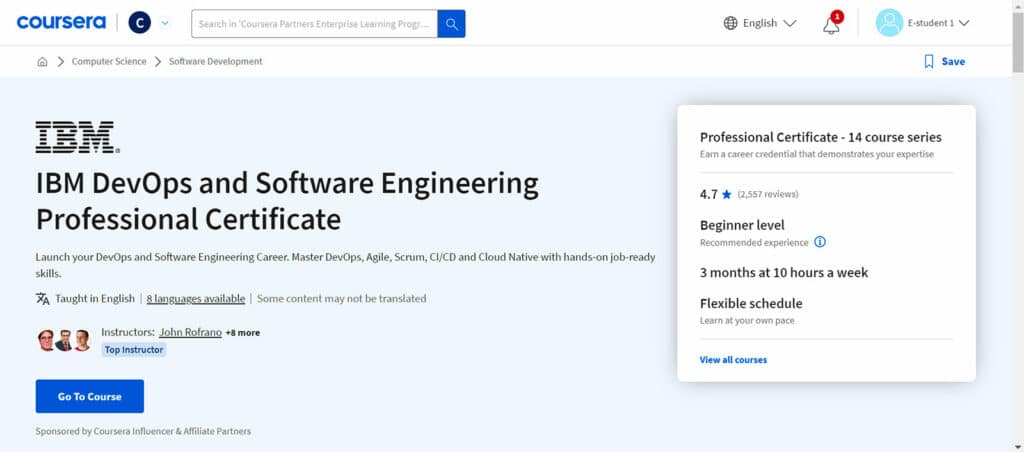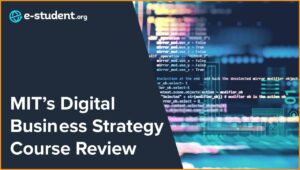
The 5 Best Ivy League Online Courses for 2022
Here are five Ivy League online courses that’ll give you a world-class education for only a fraction of the price of an Ivy League degree.
Master DevOps and Software Engineering with this Professional Certificate program from IBM on Coursera – read on for our insights in our review!
E-student.org is supported by our community of learners. When you visit links on our site, we may earn an affiliate commission.
4.5 / 5
Looking to launch a career in DevOps and software engineering? The IBM DevOps and Software Engineering Professional Certificate on Coursera offers a beginner-friendly, 13-course series accessible to those with basic IT literacy, covering Agile and Scrum methodologies, Python programming, and cloud-native tools like Docker and Kubernetes. This practical, project-based program prepares you for entry-level roles in software engineering or DevOps, emphasizing hands-on, job-ready skills over a three-month period.
The landscape of software development is continually evolving, with cloud computing playing a pivotal role in this transformation, leading to new and improved ways of working for software development teams. The demand for DevOps, in particular, is growing rapidly, with a projected increase of 122% over the next five years. On the other hand, it can be a challenging area to get into, especially if starting relatively fresh.
In this context, the “IBM DevOps and Software Engineering Professional Certificate” offered by Coursera emerges as an interesting option for an in-depth educational program focusing on the underlying skills, going beyond the confines of any single cloud platform.

Aimed at individuals seeking to master the foundational elements of DevOps and Software Engineering, the program provides a structured path for both enhancing existing skills and embarking on a new journey in software engineering.
In this review, we’ll have an in-depth look at the course to help you evaluate whether it might be a suitable choice for getting started with a career in DevOps and software engineering and if it is line with your learning priorities. Let’s get started!
The IBM DevOps and Software Engineering Professional Certificate on Coursera is designed for beginners and intermediate learners interested in exploring DevOps and Software Engineering. This course, while not leading to a formal certification (a certificate of completion is issued upon successful completion), is a valuable resource for understanding key methodologies that are crucial in the rapidly evolving field of technology deployment and management.
Structured to have a manageable weekly time commitment, this program is perfect for individuals who already have a basic understanding of programming. While it is pitched to not have any prerequisites, most complete beginners would likely struggle a bit – but it is possible as long as you take your time with the introductory courses.

It comprehensively covers Agile methodologies, CI/CD pipelines, and containerization techniques, blending theoretical knowledge with practical application to give learners a well-rounded educational experience. The course is led by IBM instructors, who are experts in their field, helping to simplify some of the more complex topics related to DevOps and Software Engineering that the course covers.
One of the main things that set this course apart is the practical exercises and projects that provide hands-on experience, bridging the gap between theory and real-world application. This approach is vital for developing the practical skills needed for effective software deployment and orchestration.
If you’re still on the fence, it’s worth noting that while I was enrolled in the full, paid version of the course in order to review it, Coursera offers the option to audit the program’s courses for free. This allows you to explore the content before making a financial commitment.
The IBM DevOps and Software Engineering Professional Certificate offered on Coursera spans about three months, demanding roughly 10 hours of study each week. With a monthly fee of $49, the total cost of the program is $147 for three months. However, if you’re dedicated and able to complete the course swiftly, you might finish within a shorter subscription period, which could reduce the total cost. Note that the Professional Certificates from IBM are not covered by a Coursera Plus subscription.
Alternatively, if you are concerned about being able to finish it in time, you can purchase access to each of the individual courses, which gives you lifetime access to them, but becomes rather pricy when adding up the 13 courses of the program.
Like most Coursera offerings, you have the option to audit this course for free, accessing the learning materials without cost. However, to fully participate, including hands-on exercises and earning a certificate of completion, you’ll need to opt for either a subscription or individual course payments.
The program is a 13-course series:
I’d suggest going through the courses in the given order, as several of them build on skills covered in previous courses. Now, let’s take a closer look at each course to see what they offer.
“Introduction to DevOps,” offered as part of the IBM DevOps and Software Engineering Professional Certificate, is designed to impart essential DevOps skills and knowledge. It opens with a discussion on the core characteristics of DevOps, focusing on building a culture rooted in shared responsibility, transparency, and a positive attitude towards failure. This course emphasizes the significance of DevOps in fostering collaborative work environments and breaking down traditional silos within organizations.
A key aspect of this course is the exploration of Continuous Integration (CI) and Continuous Delivery (CD), where learners will understand how these practices streamline the software development process, ensuring quicker and more efficient deployment. Additionally, the course covers Infrastructure as Code (IaC), which teaches managing and provisioning computing infrastructure through code rather than manual processes, enhancing efficiency and consistency. It explores Test-Driven Development (TDD) and Behavior-Driven Development (BDD), two crucial methodologies in modern software engineering. These practices encourage writing tests before code, ensuring that the software is built with testing in mind, leading to more reliable and maintainable codebases. Furthermore, the concept of cloud-native microservices, which are fundamental in building scalable and resilient applications. These topics are essential for individuals looking to excel in DevOps and software engineering.

“Introduction to Cloud Computing,” taught by Rav Ahuja, is designed for beginners and offers a flexible schedule, covering essential topics such as defining cloud computing, its history, the business case for cloud computing, and the emerging technologies enabled by the cloud. You’ll explore various cloud service models, including Infrastructure as a Service (IaaS), Platform as a Service (PaaS), and Software as a Service (SaaS), as well as different cloud deployment models like Public, Private, and Hybrid.
One of the course’s strengths lies in its coverage of emerging cloud-related trends, including Hybrid, Multicloud, Microservices, Serverless, Cloud Native, DevOps, and Application Modernization. You’ll also learn about popular cloud platforms like AWS, Microsoft Azure, Google Cloud, IBM Cloud, and others.
By the end of the course, you’ll be well-equipped to embark on a cloud computing career, with insights into job roles and opportunities in this rapidly evolving field. Whether you’re looking to switch careers or enhance your cloud knowledge, this course provides a solid foundation for your cloud computing journey.
The third module in this program focuses on Agile methodologies and the Scrum framework used in software development. The course is designed and taught by an experienced Agile practitioner, ensuring that you gain valuable insights and hands-on experience. Realistic scenario-based labs using GitHub and ZenHub provide a platform for practical application.
This course is suitable for individuals in various roles, including Project Managers, Product Managers, Executives, software developers, development managers, and IT Scrum Masters. As it mainly focuses on concepts like adaptive planning, iterative development, and continuous improvement. These principles are at the core of Agile, enabling early deliveries and customer value. The course covers Scrum as a framework and introduces related methodologies such as Waterfall, Extreme Programming (XP), and Kanban.
Moreover, you will explore practical Agile practices inspired by lean manufacturing, including test-driven development, Scrum team dynamics, Agile iterative planning, Kanban usage, burndown charts, sprint goals, and sprint review and retrospective techniques, all contributing to improved efficiency and effective sprint planning and execution with measurable results.
What sets this course apart is its practical approach and collaborative learning environment. It goes beyond theoretical knowledge, focusing on working collaboratively within a self-organizing team under the guidance of a Scrum master. The emphasis is on building what’s needed rather than rigidly adhering to a predefined plan.
“Hands-on Introduction to Linux Commands and Shell Scripting” offers a practical learning experience in Linux command-line navigation, file system operations, and the basics of shell scripting. The course focuses on essential commands, file management, and script creation, equipping learners with the skills needed to efficiently handle tasks in a Linux environment.
This course provides hands-on exposure to Linux command-line interfaces, which are crucial for DevOps professionals and software engineers. It emphasizes fundamental commands, empowering learners with the abilities required for system administration and task automation. The practical approach enables learners to gain proficiency in executing commands, managing files, and creating basic scripts, ultimately enhancing their efficiency in Linux-based environments. Overall, it serves as a foundational resource for mastering Linux command-line operations and shell scripting, which are essential skills in DevOps practices.

The fifth course in the professional certificate focuses on version control using Git and collaborative development using GitHub. This course delves into Git fundamentals, version control concepts, branching strategies, and collaborative workflows using GitHub repositories.
This course is essential for grasping version control systems and collaborative software development practices. It provides a clear introduction to Git’s core functionalities, emphasizing the significance of version control and code management. The incorporation of GitHub enables learners to explore collaborative workflows, branching models, and code repository management. In summary, it establishes a robust foundation for efficient version control and collaborative development, crucial skills in contemporary software engineering and DevOps practices
“Python for Data Science, AI & Development” covers the fundamentals of Python programming, with a focus on its application in data science, artificial intelligence (AI), and general software development. The course introduces Python’s syntax, data structures, and commonly used libraries for data analysis, AI applications, and broader software development.
This course serves as a comprehensive introduction to Python programming, catering to learners interested in data science, AI, and general software development. It effectively covers Python basics, providing a versatile skill set applicable across various domains. Learners gain insights into Python’s capabilities in data manipulation, analysis, and its usage in developing AI applications. Ultimately, it establishes a strong foundation for harnessing Python in diverse areas, which is essential for software engineers and data professionals.
“Developing AI Applications with Python and Flask” immerses learners in the world of AI-driven application development using the Python programming language and the Flask framework. This course goes beyond theory, providing a comprehensive exploration of AI concepts coupled with hands-on practical implementation within Flask-based applications.
One of the standout features of this course is its ability to bridge the gap between Python programming skills and real-world AI application development. Learners gain valuable experience in constructing AI-powered solutions from the ground up. This practical approach ensures that theoretical AI knowledge is not only understood but also applied in the context of Flask-based applications.
The course not only covers the fundamentals of AI but also guides learners through the intricacies of integrating AI models into practical applications. This integration is crucial for comprehending how AI can be harnessed to solve real-world problems effectively.

“Introduction to Containers w/ Docker, Kubernetes & OpenShift” explores containerization technologies and orchestration tools. It covers Docker container basics, Kubernetes orchestration, and OpenShift deployment, providing insights into container-based application development and management.
This course delivers essential knowledge about containerization and orchestration tools crucial for modern software deployment. It effectively introduces Docker’s core concepts, Kubernetes’ role in orchestration, and OpenShift’s deployment capabilities. Learners gain practical insights into containerized application development, management, and scalability. The course equips individuals with the foundational skills required for deploying and managing applications in containerized environments, which is valuable in today’s DevOps landscape. Overall, it provides a comprehensive understanding of container technologies and their role in efficient software deployment.

“Application Development using Microservices and Serverless” focuses on microservices architecture and serverless computing paradigms. It covers the principles, design patterns, and implementation approaches for developing applications using microservices and serverless technologies.
This course delves into advanced application development paradigms, emphasizing scalable and efficient architecture design. It effectively covers the principles of microservices, exploring their benefits and implementation strategies. Additionally, it introduces learners to serverless computing, highlighting its advantages in application deployment and management. The course provides insights into designing applications that leverage microservices and serverless architectures, enabling learners to build scalable and adaptable software solutions. Overall, it offers valuable knowledge for developing modern applications, essential for software engineers aiming for efficient and flexible software design.
“Introduction to Test and Behavior Driven Development” introduces learners to Test-Driven Development (TDD) and Behavior-Driven Development (BDD) methodologies. It covers the principles, practices, and importance of writing tests before code and incorporating behavior-driven scenarios into development.
This course is crucial for creating robust and testable software through structured development methodologies. It effectively introduces Test-Driven Development (TDD) practices, emphasizing writing tests before writing code to ensure functionality. Additionally, it explores Behavior-Driven Development (BDD), focusing on behavior-driven scenarios and collaboration between developers and non-technical stakeholders. Learners gain insights into creating clear specifications and automated tests, facilitating better code quality and understanding of user requirements. Overall, it equips individuals with practices fundamental to producing reliable and well-tested software solutions.
“Continuous Integration and Continuous Delivery (CI/CD)” covers the principles and practices of automating software development processes. It includes setting up CI/CD pipelines, automated testing, and deployment strategies for enabling faster and more reliable software delivery.

This course is critical for streamlining software development workflows and ensuring efficient deployments. It effectively covers setting up CI/CD pipelines and emphasizing automated testing and deployment strategies. Learners gain practical insights into automating software delivery processes, reducing manual intervention, and ensuring consistent and reliable software builds. The course equips individuals with the essential skills required for implementing CI/CD practices, which is crucial in modern software development environments. Overall, it offers comprehensive knowledge essential for optimizing software delivery pipelines.
“Application Security for Developers and DevOps Professionals” focuses on security practices and principles within the software development lifecycle. It covers secure coding principles, threat modeling, and strategies to mitigate security risks in applications.
This course is essential for integrating security measures into the software development lifecycle. It effectively covers secure coding practices, emphasizing the importance of identifying and mitigating security threats. Additionally, it explores various security measures, equipping learners with strategies to create secure applications. The course provides insights into threat modeling and security considerations essential for developers and DevOps professionals. Overall, it offers valuable knowledge for ensuring the security and integrity of software applications.
The “DevOps Capstone Project” serves as the culminating project for the entire program, allowing learners to apply the acquired knowledge and skills in a real-world scenario. It involves leveraging DevOps and software engineering principles to solve practical problems or create a software solution.
This capstone project integrates learned DevOps and software engineering concepts into a practical application. It serves as a culmination of the entire program, allowing learners to showcase their skills by tackling real-world challenges. The project provides an opportunity to implement a comprehensive solution, emphasizing the practical application of DevOps methodologies. Learners get hands-on experience in problem-solving, project management, and applying DevOps best practices. Overall, the capstone project consolidates the learning journey, enabling learners to demonstrate their proficiency in DevOps and software engineering.
Opinions on the IBM DevOps and Software Engineering Professional Certificate are varied. Coursera learners appreciate its comprehensive coverage of DevOps principles, practical exercises, and real-world applications. However, some find the course duration and pace challenging, particularly newcomers to the subject or those with limited time.
On platforms like Reddit and Class Central, a common recommendation is to supplement the course with extra resources, such as industry documentation or practice exercises, to deepen understanding and prepare for real-world scenarios.
While the IBM DevOps and Software Engineering Professional Certificate on Coursera provides a comprehensive path to explore DevOps methodologies, consider self-study through industry docs, whitepapers, or other relevant online courses as alternatives that you might want to consider.
Udemy has courses like “The Ultimate DevOps Bootcamp,” which, while comprehensive in scope, does not have the same quality of instruction nor the same focus on labs and practical exercises. Another option is Pluralsight’s “DevOps Foundations” Learning Path, which offers another comprehensive DevOps program but without the depth and structure of the professional certificate program on Coursera.
I highly recommend the IBM DevOps and Software Engineering Professional Certificate for its well-structured curriculum, hands-on labs, and alignment with industry standards. It serves as an invaluable resource for establishing a solid foundation in DevOps and software engineering practices.
After having gone through the whole program, I can attest that the “IBM DevOps and Software Engineering Professional Certificate” serves as a comprehensive platform for individuals aspiring to excel in the fields of DevOps and software engineering. This is a well-crafted program, equipping you with practical skills and knowledge that can be showcased through portfolio-ready projects.
Upon successful completion, learners receive a certificate from IBM and Coursera, showcasing their new expertise. However, it’s important to note that this course demands a significant commitment in terms of both time and finances.
This program equips participants with a broad understanding of DevOps methodologies and software engineering principles, making it a good starting point for mastering these software development methodologies and approaches and getting your career started. If following it diligently, you should be ready to take on a junior-level position – but for many students, it would be necessary to complement this with further course and practical work.


Here are five Ivy League online courses that’ll give you a world-class education for only a fraction of the price of an Ivy League degree.

Here’s everything you need to know about virtual reality and augmented reality in education, including use cases and benefits.

I enrolled in and completed MIT’s “Digital Business Strategy” on GetSmarter. Here’s what I liked and didn’t like about the six-week course.